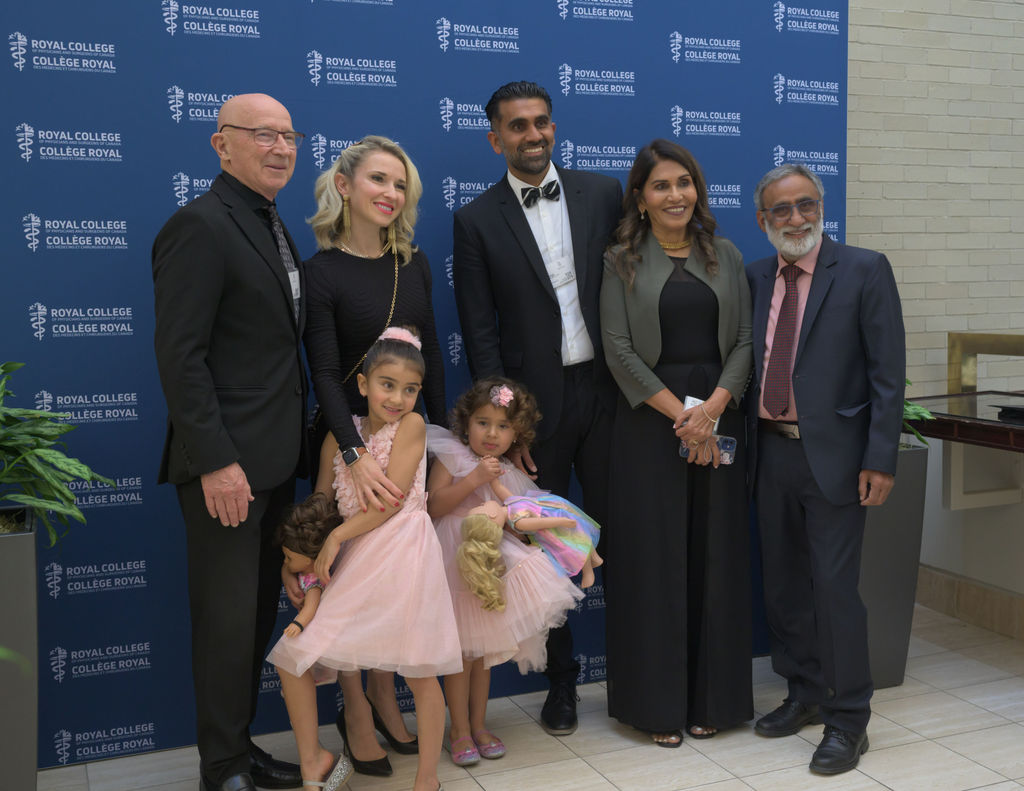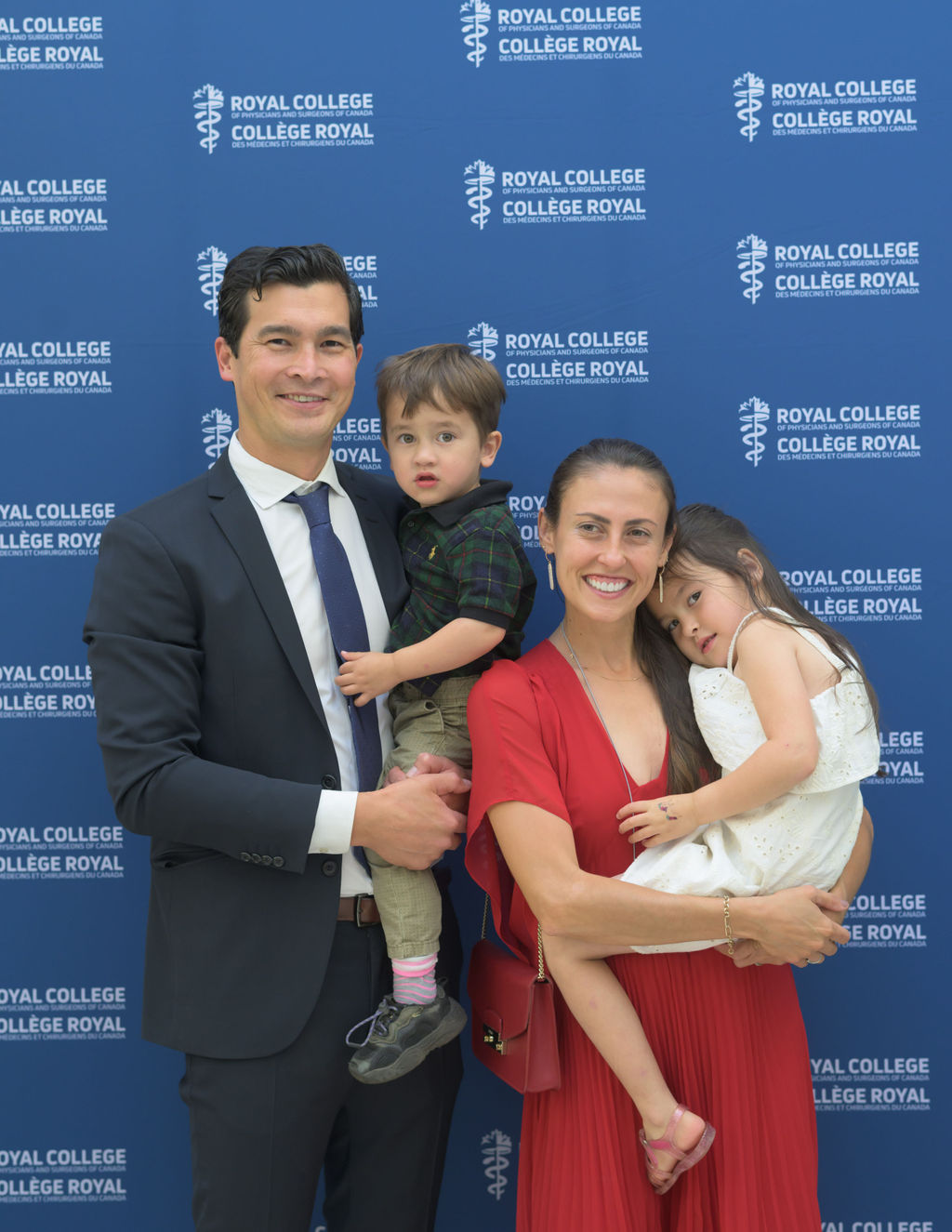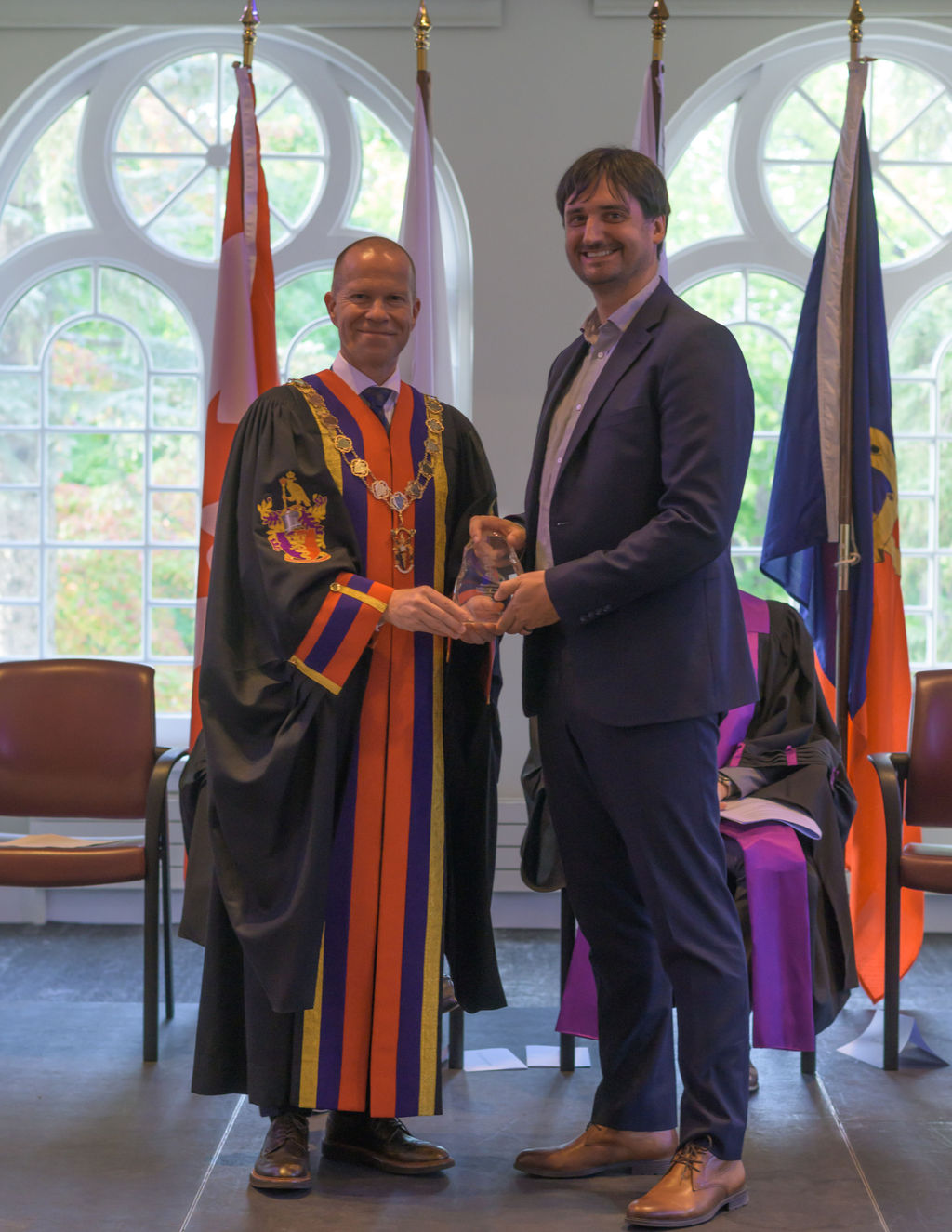- My MOC
- Directory
Menu
 6 MIN READ
6 MIN READ
The 2023 Royal College Award for Early Career Leadership winners are leveraging their personal experiences, insights and strengths to increase accessibility and impact in their respective areas of practice and medical education. Each year, this award recognizes three Royal College Fellows — within the first seven years of independent practice — who have shown outstanding leadership, initiative, service and/or innovation in medical education, health policy and professional practice.
Meet the 2023 recipients:

Dr. Mohit Singh, back centre, at the Royal College Awards Ceremony with his family.
Sometimes tackling addiction means getting out into the community and meeting patients where they are. That’s a lesson psychiatrist Mohit Singh, MD, FRCPC, learned early in his career, and it’s made him an innovator in addiction training and treatment as chief of addiction medicine with Alberta Health Services, Edmonton Zone.
“In the past three years in this position, he has played a pivotal role in advancing publicly accessible substance use programs for thousands in Edmonton,” says Daniel Li, MD, FRCPC, zone clinical department head with Alberta Health Services.
Among other innovations, Dr. Singh has contributed to new approaches to reduce harms in the opioid crisis. As a co-chair of the Opioid Response Operations Committee for the Edmonton Zone, he provided leadership to start the mobile Opioid Dependency Team (ODT), which specializes in outreach and treatment for those not ready to engage with traditional clinics.
“He has also worked with paramedic partners responding to opioid poisonings, providing options for follow-up care for individuals not ready to engage after the EMS intervention, with the mobile ODP set to play a pivotal role in response,” says Dr. Li. He describes Dr. Singh as “a tireless advocate and educator for Addiction Medicine in the community.”
Dr. Singh also provides clinical leadership for both the Henwood Treatment Centre, a 62-bed facility with a unique three-week intensive treatment for substance use, and the 42-bed Addiction Recovery Detoxification Centre.
With a rare combination of Psychiatry, forensics and addictions expertise, Dr. Singh has helped advance psychiatric services for the Edmonton Drug Treatment Court (DTC), which focuses on recovery from substance use and reintegration into the community, while reducing recidivism.
“In his role, Dr. Singh has effectively helped patients while educating lawyers on the intersection of mental health and law,” says Dr. Li.
He’s also built a reputation for innovating in addiction training for physicians in Alberta. This includes his leadership role in developing and launching a new accredited subspecialty fellowship program in addiction at the University of Alberta.

Dr. Michael Quon, left, at the Royal College Awards Ceremony with his family.
Michael Quon, MD, FRCPC, was finishing his residency when the unthinkable happened. A horrific crash while on a road cycling tour in the United States landed him in the role of patient, suffering from a traumatic brain injury, just as he was about to complete his residency in General Internal Medicine.
Now a General Internal Medicine specialist at The Ottawa Hospital, Dr. Quon knows his recovery journey has made him a better doctor — one with a greater appreciation for the patient experience. It’s also made him an advocate for physicians with disabilities.
“It motivated a lot of my interest in helping inform and develop policy to protect physicians and create a culture of accommodations for physicians with disabilities because it's been quite a void; actually, there's nothing much out there in terms of policy.”
Within his own institution, The Ottawa Hospital, Dr. Quon worked to develop a position statement for physicians with disabilities. “We decided a position statement was the best approach to sensitize these issues to hospital leadership and create some principles around accommodating physicians.”
Following the positive reception to the position statement, Dr. Quon co-led the development of an Accessibility and Accommodating Policy for Physicians with Disabilities in the Department of Medicine at The Ottawa Hospital. In addition to outlining a clear process to provide reasonable accommodations, the policy allocates up to $10,000 per physician for possible accommodation expenses. It is the first policy of its kind in Canada and has inspired the development of similar policies at other health care institutions.
Dr. Quon has also worked to effect change through the Canadian Association for Physicians with Disabilities.
“It is due to Dr. Quon’s outstanding work that a policy now exists that includes, protects and values physicians with disabilities,” says a nominator and fellow physician.
“This policy gives me the right to receive the accommodations I need to not just work as a general internist, but to use my lived experience as an asset to patient care.”
This year, Dr. Quon led the development of a new community of practice, named Physician Health Inclusion, for physicians and trainees with disabilities and chronic conditions on the Canadian Medical Association’s (CMA) online platform. A first of its kind, the CMA plans to launch the new community of support in early 2024.

Dr. Brent Thoma, right, receives the 2023 Royal College Award for Early Career Leadership – Continuing Professional Development from Royal College President Dr. Brian Hodges.
Brent Thoma, MD, FRCPC, professor in Emergency Medicine at the University of Saskatchewan, excels at identifying problems and finding solutions — often by leveraging technology.
As a standout example, when his Emergency Medicine program started implementing Competence by Design (CBD), Dr. Thoma foresaw that the amount of information to come to faculty and residents to view, process, analyze and report on would be daunting.
“His vision was to create dashboards to house all this data, that could be viewed in a very functional way,” says Rob Woods, MD, FRCPC, emergency physician, Saskatchewan Health Authority. Dr. Thoma collaborated with computer scientists at the University of Saskatchewan to create iterative versions of a dashboard using the Emergency Medicine residency program as a test case.
“Having a home-grown dashboard that Dr. Thoma created for us with our input was immensely helpful during our CBD implementation journey,” adds Dr. Woods. “The series of papers published and the open-source code that was created for the dashboard have been taken up by most universities in Canada. It is amazing to see how Dr. Thoma put our program on the map, making us a leader in medical education in Canada.”
Dr. Thoma has secured funding for his next phase of research in this area, using learning analytics to try to identify trainees in difficulty and enable early intervention and support. He is also exploring how to consolidate data from multiple institutions to determine how CBD should evolve.
“We can see at a very broad level which programs are struggling and succeeding. That can provide insight into what initiatives or supports need to be replicated in other programs and specialties,” he explains.
Embracing technology and analytics has always been part of Dr. Thoma’s approach to solving problems. “I've always liked electronics and computers and innovations and those areas,” he says. Dr. Thoma completed master’s degrees in education and technology.
Achieving leadership roles in Emergency Medicine very early in his career, he has over 130 peer-reviewed publications and has received over $600,000 in grant funding for medical education research. Dr. Thoma has the rare distinction of earning the rank of professor in his first six years of practice and recently took on the challenging role of interim associate dean of postgraduate medical education at the new Toronto Metropolitan School of Medicine.